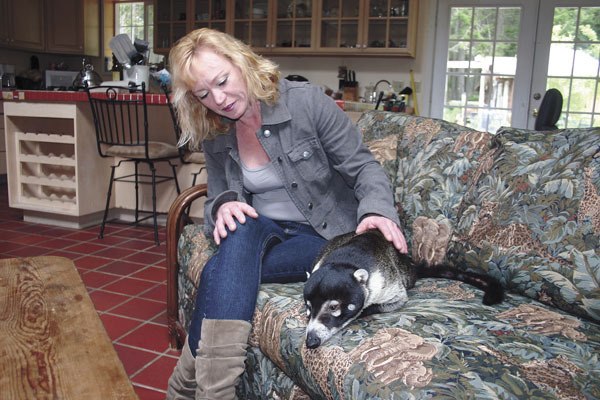Jack lies peacefully on one couch cushion stacked atop another, eyes closed, the picture of innocence.
Hardly the type of fellow one would suspect of kicking off South Whidbey’s first wild coatimundi chase.
But this was Monday. A week from the prior Friday Jack, who looks like a raccoon except for his long snout and very long tail, was scurrying around Lone Lake Road, a relatively lonesome route lined by tall trees on either side.
Several women were chasing him while motorists passed by slowed, some taking pictures to set the South End abuzz with Facebook and Twitter posts.
“I saw this thing last night on Lone Lake Road,” stated Erin Hanson on her Facebook page.
“What is it?” Hanson later said she saw several people trying to capture the curious creature as she took pictures of it.
As it turned out, they were eventually successful.
At the other end of Lone Lake Road, near Saratoga, Ali Frye somehow ended up with Hanson’s message on her smart phone. She looked at the strange critter and called the paper.
“He’s cute,” she said. “Some woman has an exotic pet out here.”
That woman turned out to be Rhonda Galbraith, who lives with Jack in an RV in Clinton but spends a lot of time at a friend’s house on Andreason Road, just off Lone Lake Road.
Early Friday morning, May 10, Galbraith let Jack out into the backyard for some fresh air.
“I got busy and he went over the fence and took off,” she said. “I looked for a couple hours then went to sleep. When I woke up he was next to the shop where he found a slug and ate it, then he left again.”
By that time she had to go to work at the motel in Freeland.
“He was in the woods. I was so worried.”
Her worries came to an end late that afternoon when she learned a friend had managed to chase Jack down with the help of a couple of others and corner him on adjoining property.
“A friend called and said ‘I found Jack!’,” she said. “He got lost is what happened. Oh my gosh, I was so happy I was crying.”
Soon Jack was back in his rightful spot on the couch and Galbraith was determined he would never cause such a commotion again.
“I make sure I’m outside with him at all times,” she said.
As she talks she strokes the placid Jack, but perhaps the interview is annoying him. He stands up, raises his tail in a threatening manner and takes a nip at her hand. Galbraith, accustomed to such behavior, dodges his sharp teeth.
“It’s like having a 2-year-old all the time,” she said of living with Jack.
“And it’s lots of exercise chasing him around. I wouldn’t recommend a wild exotic animal.”
In the RV they share, Galbraith takes the lower portion.
“He’s got the upper portion but he comes down at night,” she said.
She tries to cheer Jack up by offering him a banana, but still in a foul mood he slaps it to the floor.
She’s unfazed.
“He eats oranges and bananas and he loves spaghetti, snacks, dog food, cheese and hot dogs,” she said.
And, of course, the occasional slug.
Coatimundi are native to Central American but their range extends into Texas and Arizona, she said. In the wild they run in packs, but Jack has never enjoyed that experience.
Galbraith’s mother, in Forks, purchased a pair of them in Yelm more than 10 years ago. The female, Rosie, died 18 months ago so Gailbraith took Jack off her mother’s hands.
Fortunately, she only has one to deal with.
“They never mated,” she said.
Jack growls to express his displeasure and “squeaks” when he’s happy.
“Generally he’s guarding his territory when he gets snippy,” she said.
All they need to find happiness is something better than the RV to live in. “I’d really like a bigger place for us,” she said.
Jack Lee, a biologist with the Washington Department of Fish and Wildlife, said there’s “nothing illegal” about owning a coatimundi. But he was glad to hear of the report from Whidbey.
“It does answer some questions,” he said. “There had been a badger report.”
Come to think if it, Jack does look a bit like a badger, if you could find one curled up on a short stack of couch cushions.


